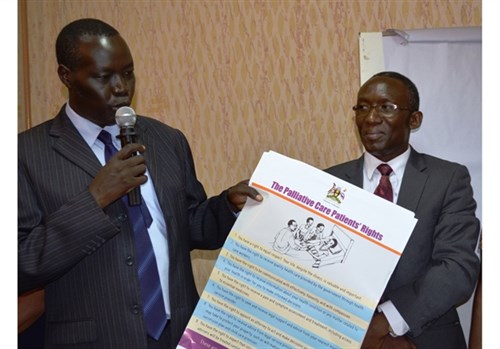Development of legal and human rights guidelines for palliative care in Uganda
There are several legal and human rights-related problems which face palliative care patients and their families in Kenya, Uganda and Tanzania. For such problems to be addressed, some and practice guidelines in a related to the legal needs of palliative care patients and their families have been reviewed.
6 Nov 2014Palliative care patients and their families in Uganda, like elsewhere in the world, are very vulnerable; not only physically but also socially, culturally, psychologically and spiritually. Many health workers are ill-informed about legal issues and palliative care workers often do not have adequate legal training, or a network of support to draw on for legal advice for their patients. Many palliative care programmes lack multidisciplinary teams with legal capacity. In 2009, the African Palliative Care Association (APCA), in collaboration with the Open Society Foundations' Law & Health Initiative, International Palliative Care Initiative (IPCI) and Open Society Institute for East Africa (OSIEA), reviewed laws and practice guidelines in Kenya, Uganda and Tanzania related to the legal needs of palliative care patients and their families.
In 2009, the African Palliative Care Association (APCA), in collaboration with the Open Society Foundations' Law & Health Initiative, International Palliative Care Initiative (IPCI) and Open Society Institute for East Africa (OSIEA), reviewed laws and practice guidelines in Kenya, Uganda and Tanzania related to the legal needs of palliative care patients and their families.
The group undertook a rapid appraisal among legal practitioners, policy makers, palliative care providers and patients in Kenya and Uganda to identify their understanding of the legal and human rights issues that hinder palliative care provision.
The review and appraisal identified some of the legal and human rights barriers that affect the advancement of palliative care, particularly the availability of medications. There are several legal and human rights-related problems which face palliative care patients and their families. These include: gender-based violence, property ownership and evictions, unfair cultural practices, will making and issues that arise after death, divorce and related issues, children’s rights, ethical issues, lack of access to medications and the fact that Patients are often ignorant of their own rights and entitlements and do not have access to legal services.
For such problems to be addressed, palliative care programmes need to have clear guidelines and access to legal support within the health system.
Read here some of the activities were undertaken to develop such guidelines.
Doctors can lead the way to healthier drug policies – join IDHDP now.
Share this on: